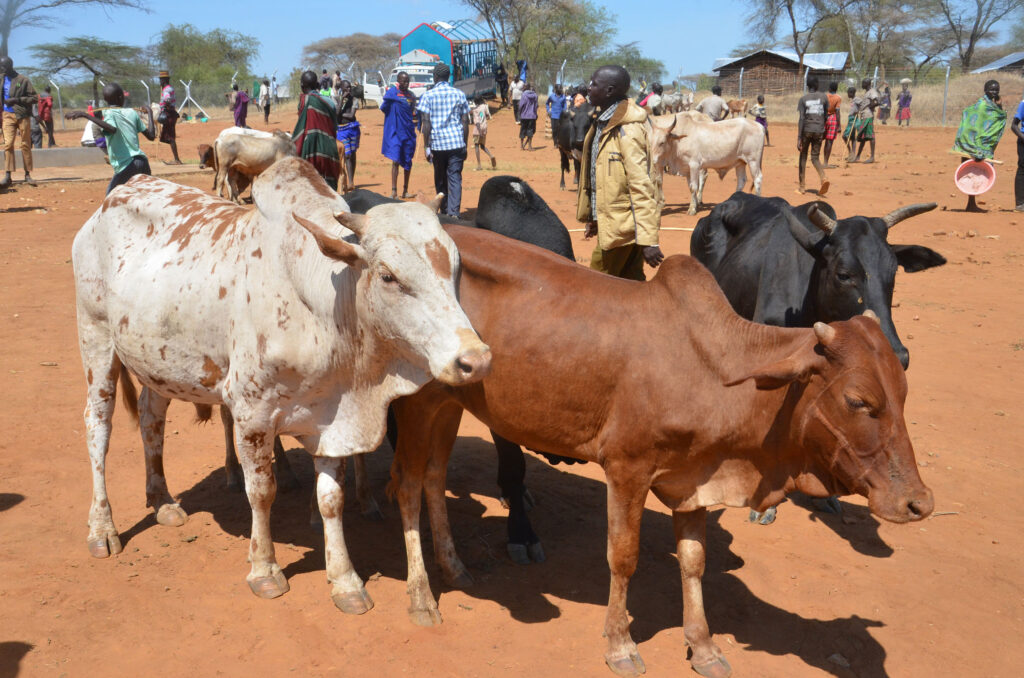By Olandason Wanyama
The continued demand for cattle, goats and sheep on top of the prevailing drought in Karamoja have triggered the spike in prices in the sub region.
A year ago a bull that cost Shs. 1.1 today goes for Shs 2.2 million, yet a heifer that cost Shs. 300,000 is now sold between Shs. 650,000-850,000. A goat that was sold at Shs. 80,000-120,000 last year now goes for Shs. 300,000.
However, the sheep have maintained their prices at Shs 80,000- 12000 for a huge male due to the low demand amongst the traders and few witchdoctors buying them for ritual purposes. The cows are negotiated between Shs. 600,000 – 800,000 depending on the size..
Jeremiah Lomonyang, a para-veterinary stationed at Nadunget cattle market says the supplies are certain to continue looking at the drought, insecurity and diseases that have hit the livestock industry.
He adds that there are so many traders fighting for a limited number of animals on market adding that this year could be different from the rest.
Lomonyang also attributes the demand to loss of animals at the peak of insecurity from August 2020 – March 2023, when Karamoja experienced lots of livestock thefts.
Therefore, he added that households do not have animals coupled with the effects of climate change in the sub region.
Denis Barasa, district veterinary officer Moroto attached to Nadunget market when contacted, acknowledged the skyrocketing prices for animals in most parts of the sub region.
“It is true the prices have shot up in the past few months,” he noted, adding that in the recent past some scrupulous youths would just pick animals along the way and bring them for sale.
Barasa says families have to ensure they balance the demands at home with the few cows on ground.
“Few animals cost less than a million today,” he said the prices have shot up in the past weeks
But since the army intensified the search for the stolen cows, each animal has to be sold with the right documentation.
“We had so many people arrested after being caught with stolen cows,” Barasa said, adding that the animals that are being sold are genuine now.
Also Barasa said quite a number of animals have died in the past due to the tick-borne diseases, an issue he says that in the past three there has been a failed service delivery due to the insecurity in the villages,” he noted.
He however, says since there is relative calm, the issues between herders and service providers will be boosted with visits to the kraals to ensure animals are alive as before.

Herders speak
On behalf of herders, Andrew Sagal, a resident of Nadunget Town council says the Karimojong have been cheated for decades but today its blessing that a family can sell one bull and all the basics at home are met.
“We just have to ensure sustainable peace,” he noted, adding that this will allow it to restock like a decade ago. When the animals multiplied prices went low but today we are just struggling to emerge from a five year-conflict.
Sagal said the insecurity has cost lives, property and doom for the sub region for almost half a decade but with the return to normalcy Karamoja will prosper again.
What traders said
Gasta Luyiga, a Kampala based trader says the prices of cows could force most of us outside the cattle business.
He identifies the costly fuel, taxes, accommodation and meals as the basics in the livestock business.
“The prices of cattle have gone beyond our expectations,” adding that some of the traders will turn to other businesses if a kilo of beef is not adjusted from Shs 13,000 – 15,000 to 18,000 in various towns across Uganda.
He says he borrowed Shs. 3 million to do livestock business but this is just one bull in Karamoja markets.
“For the past months prices have scared most traders,” Luyiga noted, adding that we just have to continue the struggle till we collapse. He appealed to the government to consider revising the cost of fuel so as to support retail businesses.





